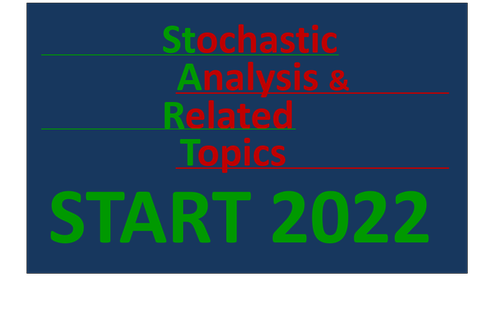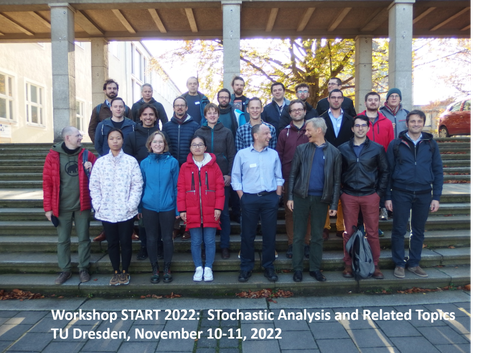Workshop START 2022: STochastic Analysis and Related Topics
Workshop START 2022: STochastic Analysis and Related Topics
Time:
Thursday 10th and Friday 11th of November 2022
Venue:
TU Dresden, Mathematics
Building Z21: Zellescher Weg 25, 01217 Dresden (Map)
Room 250 (Map)
Organizers:
Anita Behme, Martin Keller-Ressel, René Schilling
______________________________________________________________________________________
Participants & Talks:
Schedule
- Andreas Basse O'Connor (Aarhus)
Equivalent martingale measures for Lévy-driven moving averages
Abstract: In the present paper, we obtain sufficient conditions for the existence of equivalent local martingale measures for Lévy-driven moving averages and other non-Markovian jump processes. The conditions that we obtain are, under mild assumptions, also necessary. For instance, this is the case for moving averages driven by α-stable Lévy processeswith α ∈ (1, 2].
-
Tiziano De Angelis (Turin)
A change of variable formula with applications to multi-dimensional optimal stopping problems
Abstract: We derive a change of variable formula for
$C^1$ functions $U:\mathbb{R}_ +\times\mathbb{R}^m\to\mathbb{R}$
whose second order spatial derivatives may explode and not be integrable in the neighbourhood of a surface
$b: \mathbb{R}_+\times \mathbb{R}^{m-1}\to \mathbb{R}$
that splits the state space into two sets $\mathcal C$ and $\mathcal D$. The formula is tailored for applications in problems of optimal stopping where it is generally very hard to control the second order derivatives of the value function near the optimal stopping boundary. Differently to other existing papers on similar topics we only require that the surface $b$ be monotonic in each variable and we formally obtain the same expression as the classical It\^o's formula. Joint work with Cheng Cai (Credit Suisse). -
Martin Friesen (Dublin City University)
Stationarity and limiting distributions of affine Volterra processes
Abstract: Recent observations on intra-day stock market data suggest that the volatility process is much rougher than predicted by existing Markovian models based on the Brownian motion (e.g. the Heston model). To accommodate for this feature, it was proposed in the literature to model these observations by their rough counterparts, the so-called affine Volterra processes. The latter ones are obtained as weak solutions from stochastic Volterra equations of convolution type with certain affine linear coefficients. One remarkable feature of affine Volterra processes is that these processes allow us to compute their characteristic function from a solution of a nonlinear Volterra Riccati equation. In this talk, we are interested in the long-time behavior of affine Volterra processes on the state space $\mathbb{R}_+^m$. Based on a detailed study of the Volterra Riccati equation, we analyze possible limit distributions and subsequently prove the law of large numbers as well as the central limit theorem for the long-term mean volatility. Moreover, for each limit distribution, we construct the corresponding stationary process and express its f.d.d. in terms of solutions to a generalized system of Volterra Riccati equations. In dimension one, our results show that limit distributions and stationary processes are unique (despite the presence of memory in the model) if and only if the Volterra kernel is integrable. This work is joint with P. Jin. -
Kamil Kaleta (Wroclaw)
Quasi-ergodicity of compact strong Feller semigroups in L^2
Abstract: We present recent results, obtained jointly with R. Schilling, on the
quasi-ergodic properties of semigroups of (possibly non-self-adjoint)
compact integral operators acting on L^2 spaces. The semigroups under
consideration are assumed to be strong Feller, ultracontractive and
positivity improving. We find some new general relations between spectral
and analytic regularity and quasi-ergodicity of such semigroups, and discuss
various examples. We focus on Schrodinger semigroups and transition
semigroups of killed Markov proocesses evolving in unbounded spaces. -
Martin Kolb (Paderborn)
Diffusions with random jumps from the boundary
Abstract: We give a survey of results connected to diffusion processes with random jumps from the boundary. This class of processes is elementary to define, but it gives rise to interesting probabilistic as well as analytic research problems. -
Mateusz Kwasnicki (Wroclaw)
Liouville's theorems for Lévy operators
Abstract: I will discuss new Liouville-type theorems for Lévy operators (or Lévy processes), obtained jointly with Tomasz Grzywny, which extend previously known results due to Fall, Fall–Weth, Alibaud–del Teso–Endal–Jakobsen, and Berger–Schilling.
-
Aleks Mijatovic (Warwick)
When is the convex hull of a Lévy path smooth?
Abstract: In this talk we characterise (in terms of the transition probabilities) the class of one-dimensional Lévy processes whose graph has a (planar) convex hull with a continuously differentiable boundary. We show that this phenomenon is exhibited by a broad class of infinite variation Lévy processes and depends subtly on the behaviour of the Lévy measure at zero. We introduce a class of strongly eroded Lévy processes, whose Dini derivatives vanish at every local minimum of the trajectory for all perturbations with a linear drift, and show that these are precisely the processes with smooth convex hulls. We discuss how the smoothness of the convex hull can break, demonstrate examples exhibiting a variety of smooth/nonsmooth behaviours and conjecture that an infinite variation Lévy process is either strongly eroded or abrupt, a claim implied by Vigon’s point-hitting conjecture. This is joint work with David Bang and Jorge Gonzalez Cazares. -
Ilya Pavlyukevich (Jena)
Heterogeneous diffusion: non-uniqueness, uniqueness and selection
Abstract: We study solutions of the irregular/singular Stratonovich SDE
$dX = |X|^\alpha \circ dB$, $α\alpha (0, 1)$. In particular we construct solutions spending positive time in 0, describe solutions spending zero time in 0, and show how a particular physically natural solution can be singled out by means of an additional external ambient noise. This talk is based on the joint work with G. Shevchenko (Kiev). -
Sergio Pulido (ENSIIE Paris)
The rough Heston model with self-exciting jumps
Abstract: We introduce a novel affine Volterra stochastic volatility model by adding jumps with a self-exciting structure to the dynamics of the variance process and the log returns in the well-known rough Heston model. In particular, the variance process is given in terms of the solution of a stochastic affine Volterra equation of convolution type with jumps. Thanks to the affine structure of the model we can provide explicit formulas for the Laplace transforms of quantities like log-prices and their quadratic variation, variance swap rates, integrated variance, and VIX squared. These formulas can be exploited to price options using Fourier inversion techniques. The procedure to get the explicit expressions for these transforms essentially relies on the martingale property of complex-valued exponential processes and comparison results for (deterministic) Riccati-Volterra equations. We illustrate with numerical examples the behavior of the implied volatility smiles for options written on the underlying asset and on the VIX. Joint work with Alessandro Bondi and Simone Scotti. - Sara Svaluto-Ferro (University of Verona)
From signature-based models to affine and polynomial processes and backAbstract: Modern universal classes of dynamic processes, based on neural networks or signature methods, have recently entered the field of stochastic modeling, in particular in Mathematical Finance. This has opened the door to more data-driven and thus more robust model selection mechanisms, while principles like no arbitrage still apply. We analyze here different types of signature models.
In the first part, we focus on models based on the signature of a supporting process, which can range from a Brownian motion, to a multidimensional Levy-process, to a general multidimensional tractable stochastic process. We also present methods how to fit these models to data.
In the second part we focus on signature SDEs, i.e. SDEs whose characteristics are linear functions of the process’ signature. We show how these new models can be embedded in the framework of affine and polynomial processes, which have been - due to their tractability - the dominating process class prior to the new era of highly overparametrized dynamic models. We show that generic classes of diffusion models can be described in terms of a signature SDEs. This allows to get power series expansions for expected values of analytic functions of the process' marginals.
The talk is based on joint works with Christa Cuchiero, Guido Gazzani and Josef Teichmann. - Bruno Toaldo (Turin)
Exit time of semi-Markov processes and the non-local heat equation on a time dependent domain
Abstract: We introduce the theory of semi-Markov processes and their governing non-local equations. Then we focus on a non-local (in time) heat equation on a time-increasing parabolic set whose boundary is determined by a suitable curve. We provide a notion of solution for this equation and we study well-posedness under Dirichlet conditions outside the domain. A maximum principle is proved and used to derive uniqueness and continuity with respect to the initial datum of the solutions of the Dirichlet problem. Existence is proved by showing a stochastic representation based on the delayed Brownian motion killed on the boundary. (Joint work with G. Ascione and P. Patie) -
Vitali Wachtel (Bielefeld)
Persistence of AR(1) sequences with Rademacher innovations and deterministic dynamical systems
Abstract: My talk will be devoted to the asymptotic behaviour of persistence probabilities for AR(1) chains with i.i.d. innovations with the Rademacher distribution. Probably the most standard approach to persistence probabilities for AR-type processes consists in using compactness properties of corresponding transition operators. But it is not at all clear how to implement this strategy in the case of discrete innovations. More precisely, it is not clear what functional space should be used in compactness arguments. It turns out that in the case of Rademacher innovations there is a close connection between our AR(1)-chain and a deterministic, piecewise linear dynamical system. That connection allows one to construct an appropriate Banach space and to study exact asymptotics for persistence probabilities. Moreover, orbits of the dynamical system determine the corresponding quasi-stationary distribution.
-
Alex Watson (London)
Markov additive friendships
Abstract: In Lévy processes, the Wiener-Hopf factorisation describes the way the sample path achieves new maxima and minima in terms of a pair of subordinators. Vigon’s theorem of friends is its converse: a way to construct a Lévy process with known Wiener-Hopf factorisation out of a given pair of subordinators which are "friends". In this talk, I will discuss the analogous problem for Markov additive processes. I will give some sufficient conditions for friendship of Markov additive subordinators, and show that some new subtleties arise.
This is joint work with Leif Döring (Mannheim) and Lukas Trottner (Aarhus).


